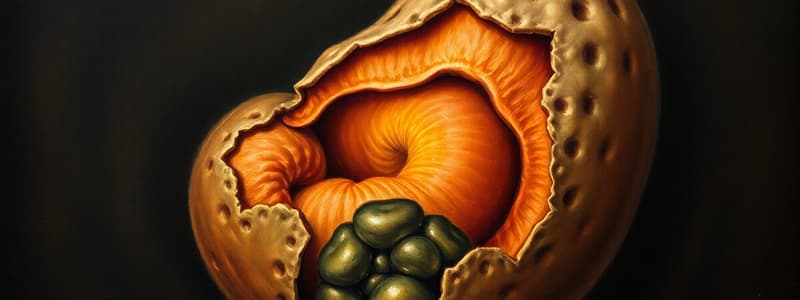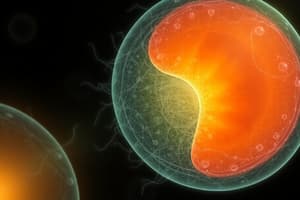Podcast
Questions and Answers
What is the primary event occurring during the third week of gestation?
What is the primary event occurring during the third week of gestation?
- Implantation
- Neurulation
- Gastrulation (correct)
- Organogenesis
What initiates the process of gastrulation?
What initiates the process of gastrulation?
- Formation of the hypoblast
- Formation of the primitive streak (correct)
- Formation of the prechordal plate
- Formation of the notochord
Which layer is formed from the cells that remain in the epiblast after invagination?
Which layer is formed from the cells that remain in the epiblast after invagination?
- Ectoderm (correct)
- Endoderm
- Mesoderm
- Hypoblast
Which structure is formed between the notochord and the oropharyngeal membrane?
Which structure is formed between the notochord and the oropharyngeal membrane?
What process occurs when epiblast cells migrate and detach to move beneath the epiblast?
What process occurs when epiblast cells migrate and detach to move beneath the epiblast?
Which factor is responsible for controlling cell specification into mesoderm during gastrulation?
Which factor is responsible for controlling cell specification into mesoderm during gastrulation?
What is the fate of cells that displace the hypoblast during gastrulation?
What is the fate of cells that displace the hypoblast during gastrulation?
As cells migrate during gastrulation, in which directions do they spread?
As cells migrate during gastrulation, in which directions do they spread?
What is the role of capillaries in tertiary villi during embryonic development?
What is the role of capillaries in tertiary villi during embryonic development?
What is formed when cytotrophoblastic cells penetrate the syncytium?
What is formed when cytotrophoblastic cells penetrate the syncytium?
What are stem or anchoring villi responsible for?
What are stem or anchoring villi responsible for?
What is the function of free (terminal) villi?
What is the function of free (terminal) villi?
How does the connecting stalk relate to the later development of the embryo?
How does the connecting stalk relate to the later development of the embryo?
What type of mesoderm do cells migrating through the cranial region of the node become?
What type of mesoderm do cells migrating through the cranial region of the node become?
What is the primary factor contributing to the elongation of the embryonic disc?
What is the primary factor contributing to the elongation of the embryonic disc?
When does the formation of the germ layers continue in the caudal segments of the embryo?
When does the formation of the germ layers continue in the caudal segments of the embryo?
What characterizes the trophoblast by the beginning of the third week?
What characterizes the trophoblast by the beginning of the third week?
What is formed when mesodermal cells penetrate the core of primary villi?
What is formed when mesodermal cells penetrate the core of primary villi?
During which week does the primitive streak show regressive changes and begin to shrink?
During which week does the primitive streak show regressive changes and begin to shrink?
What is the definitive placental villus formed from?
What is the definitive placental villus formed from?
Which type of mesoderm is formed by cells migrating at the lateral edges of the node?
Which type of mesoderm is formed by cells migrating at the lateral edges of the node?
What is the primary function of the notochord in embryonic development?
What is the primary function of the notochord in embryonic development?
Which structure appears similar in composition to the cloacal membrane?
Which structure appears similar in composition to the cloacal membrane?
At which embryonic structure does the notochord extend cranially towards?
At which embryonic structure does the notochord extend cranially towards?
What happens to the hypoblast during the formation of the definitive notochord?
What happens to the hypoblast during the formation of the definitive notochord?
What is the role of the neurenteric canal during embryonic development?
What is the role of the neurenteric canal during embryonic development?
When does the allantois typically appear during development?
When does the allantois typically appear during development?
What distinguishes the notochordal plate from the definitive notochord?
What distinguishes the notochordal plate from the definitive notochord?
What is the result of the invagination of prenotochordal cells during development?
What is the result of the invagination of prenotochordal cells during development?
Flashcards
Gastrulation
Gastrulation
The process of forming the three primary germ layers (ectoderm, mesoderm, and endoderm) during the third week of gestation.
Primitive Streak
Primitive Streak
The first structure to form during gastrulation, a thickened groove on the surface of the epiblast.
Primitive Node
Primitive Node
The cephalic end of the primitive streak with an elevated area surrounding a small pit.
Invagination
Invagination
Signup and view all the flashcards
Fibroblast Growth Factor 8 (FGF8)
Fibroblast Growth Factor 8 (FGF8)
Signup and view all the flashcards
Ectoderm
Ectoderm
Signup and view all the flashcards
Mesoderm
Mesoderm
Signup and view all the flashcards
Endoderm
Endoderm
Signup and view all the flashcards
Oropharyngeal membrane
Oropharyngeal membrane
Signup and view all the flashcards
Prenotochordal cells
Prenotochordal cells
Signup and view all the flashcards
Notochordal plate
Notochordal plate
Signup and view all the flashcards
Definitive notochord
Definitive notochord
Signup and view all the flashcards
Prechordal plate
Prechordal plate
Signup and view all the flashcards
Neurenteric canal
Neurenteric canal
Signup and view all the flashcards
Cloacal membrane
Cloacal membrane
Signup and view all the flashcards
Allantoenteric diverticulum (Allantois)
Allantoenteric diverticulum (Allantois)
Signup and view all the flashcards
What is invagination?
What is invagination?
Signup and view all the flashcards
What is gastrulation?
What is gastrulation?
Signup and view all the flashcards
What germ layer is formed from cells migrating laterally at the primitive node?
What germ layer is formed from cells migrating laterally at the primitive node?
Signup and view all the flashcards
What germ layer arises from cells migrating through the midstreak?
What germ layer arises from cells migrating through the midstreak?
Signup and view all the flashcards
What germ layer is formed from cells migrating through the more caudal part of the streak?
What germ layer is formed from cells migrating through the more caudal part of the streak?
Signup and view all the flashcards
What tissue is formed by cells migrating through the caudalmost part of the streak?
What tissue is formed by cells migrating through the caudalmost part of the streak?
Signup and view all the flashcards
How does the embryonic disc grow?
How does the embryonic disc grow?
Signup and view all the flashcards
How does gastrulation affect the embryo's development?
How does gastrulation affect the embryo's development?
Signup and view all the flashcards
Trophoblast
Trophoblast
Signup and view all the flashcards
Villi
Villi
Signup and view all the flashcards
Vascularization of the villi
Vascularization of the villi
Signup and view all the flashcards
Cytotrophoblast shell
Cytotrophoblast shell
Signup and view all the flashcards
Connecting stalk
Connecting stalk
Signup and view all the flashcards
Study Notes
Third Week of Development
- Gastrulation is the defining event of the third week of gestation, establishing the three germ layers: ectoderm, mesoderm, and endoderm.
- Gastrulation begins with the formation of the primitive streak on the epiblast.
- Initially, the primitive streak is indistinct, but by day 15-16, it appears as a narrow groove with slightly bulging regions on either side.
- The cephalic end of the streak contains the primitive node, a slightly elevated area surrounding the primitive pit.
- Epiblast cells migrate towards the primitive streak.
- These cells detach from the epiblast and move beneath it, a process called invagination.
- This inward movement creates the mesoderm and endoderm.
- Mesoderm and endoderm formation displace the hypoblast.
- Fibroblast Growth Factor 8 (FGF8) controls cell specification into mesoderm.
- The prechordal plate forms between the tip of the notochord and oropharyngeal membrane, playing a crucial role in forebrain induction.
Formation of the Notochord
- Notochord formation involves prenotochordal cells migrating from the primitive node to the prechordal plate.
- Initially, these cells intercalate with the hypoblast, forming the notochordal plate.
- As endoderm cells replace the hypoblast, cells of the notochordal plate proliferate and detach from the endoderm to form a solid cord called the definitive notochord.
- The elongation of the notochord is a dynamic process, with the cranial end developing first and the caudal regions following.
- The notochord extends cranially to the prechordal plate and caudally to the primitive pit. A neurenteric canal temporarily connects the amniotic and yolk sac cavities.
Formation of the Cloacal Membrane
- The cloacal membrane forms at the caudal end of the embryonic disk.
- It is similar in structure to the oropharyngeal membrane, consisting of tightly adherent ectoderm and endoderm layers without intervening mesoderm.
- The posterior wall of the yolk sac develops a small diverticulum, known as the allantois, around day 16 of development.
Growth of the Embryonic Disc
- The embryonic disc, initially flat, gradually elongates, with a broader cephalic and narrower caudal end.
- Expansion primarily occurs in the cephalic region, while the primitive streak region remains relatively constant.
- Cell migration from the primitive streak region drives cephalic growth.
- Invagination and subsequent migration of surface cells in the primitive streak continue until the fourth week of development before the primitive streak regresses and disappears.
Further Development of the Trophoblast
- By the beginning of the third week, the trophoblast develops primary villi consisting of a cytotrophoblastic core covered by a syncytial layer.
- Mesodermal cells penetrate into the core of the primary villi.
- Secondary villi form as mesodermal cells differentiate into blood cells and blood vessels.
- The villi become tertiary villi, or definitive placental villi.
- Capillaries in tertiary villi connect with the intraembryonic circulatory system, linking the embryo and the placenta.
- Cytotrophoblastic cells extend to the maternal endometrium, forming a cytotrophoblast shell, which firmly attaches the chorionic sac to the maternal tissue.
- Villi extend from the chorionic plate to the decidua basalis, called stem or anchoring villi. Other villi, called free villi, branch from the stem villi and are involved in the exchange of nutrients and other materials.
- The chorionic cavity expands, and a connecting stalk forms, which later develops into the umbilical cord, connecting the embryo to the placenta.
Studying That Suits You
Use AI to generate personalized quizzes and flashcards to suit your learning preferences.




